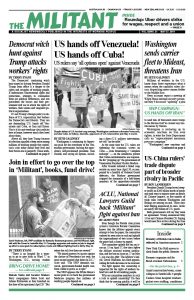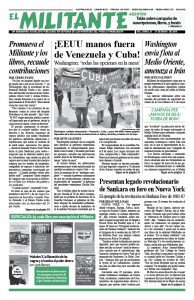May 30, 1994
A major confrontation is looming in the two-year war between members of the United Auto Workers and the bosses at Caterpillar, Inc. The entire labor movement has a stake in its outcome.
On May 16 workers at the giant earth moving equipment company’s Mossville, Illinois, plant walked off the job after the company suspended 30 workers for hanging balloons with union slogans in the factory. Another 30 workers were indefinitely suspended for attending a labor rally in Peoria, Illinois. Fifteen thousand unionists from across the country participated in that rally to show solidarity with the fighting Cat workers.
Two years ago UAW members waged a five-month strike. When management threatened to call in scabs, rank and file workers poured onto the picket lines. They only returned to work under orders from top union officials.
May 30, 1969
A victory for the anti-Vietnam War movement and for constitutional rights was achieved May 20 when Army authorities at Ft. Jackson, S.C., announced they were dropping their planned prosecution of the last three of eight antiwar GIs. The case is probably without parallel in U.S. military history.
The eight victorious servicemen, whom the Army originally intended to imprison had been guilty of no other “crime” than insisting on exercising the constitutional right of free speech to discuss and express their opposition to U.S. aggression in Vietnam.
While the GIs’ outspoken opposition to the war was hardly to the liking of the brass, the men exercised sound judgment in obeying all the rules of military life and simply insisting on exercising rights guaranteed them by the U.S. Constitution.
May 27, 1944
As soon as the resentment of the workers, aggravated by the deliberate stalling tactics of the War Labor Board, erupts into open resistance against the provocative acts of management, the whole machinery of the federal government is mobilized as a strikebreaking weapon in the service of Big Business. That is the real significance of the farcical “seizure” of the Montgomery Ward plant at Chicago and the Ward subsidiary, the Hummer Manufacturing Company, at Springfield, Illinois. The Roosevelt administration acted only after the workers, their patience exhausted by the interminable run-around of the WLB, struck the plants.
The workers were forced to strike in order to defend the existence of their unions against the open shop drive instituted by J. P. Morgan and Company which controls Montgomery Ward.

